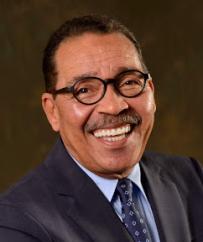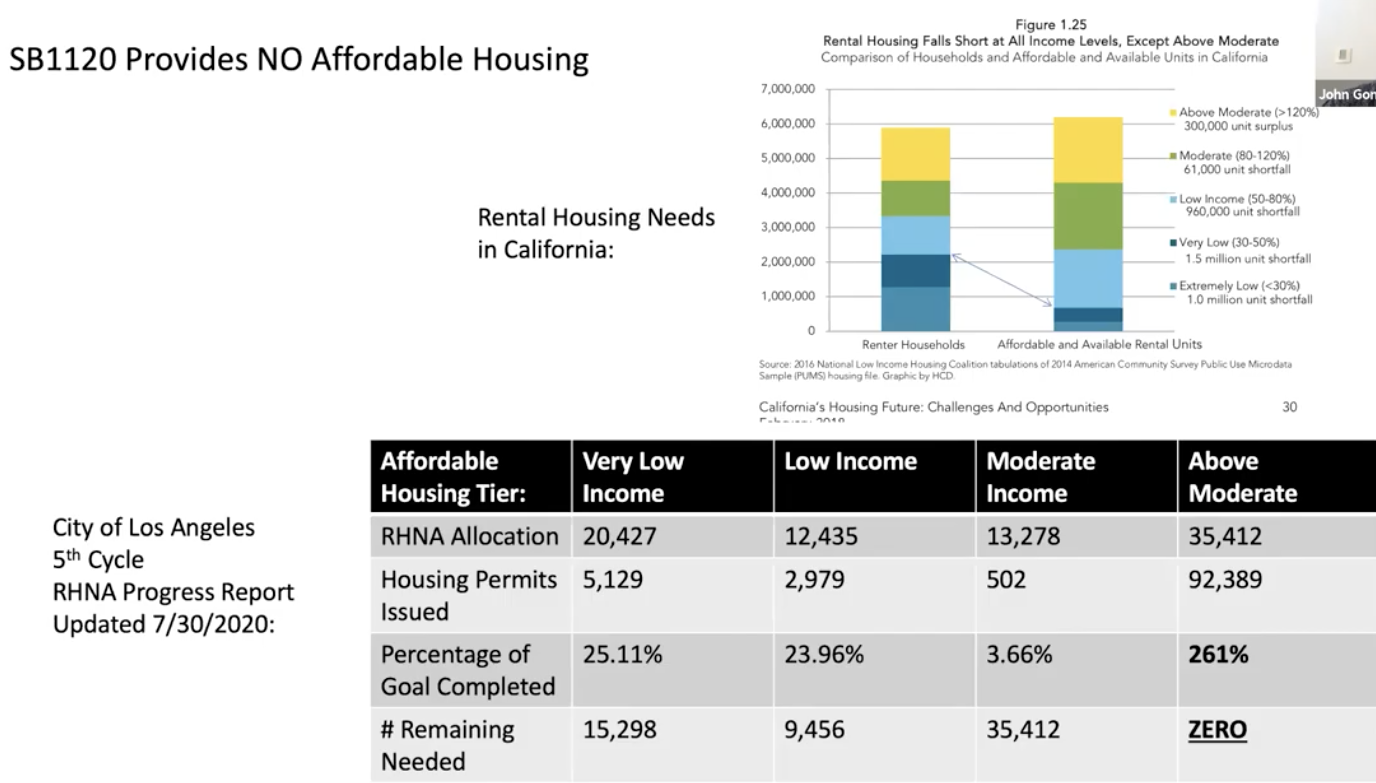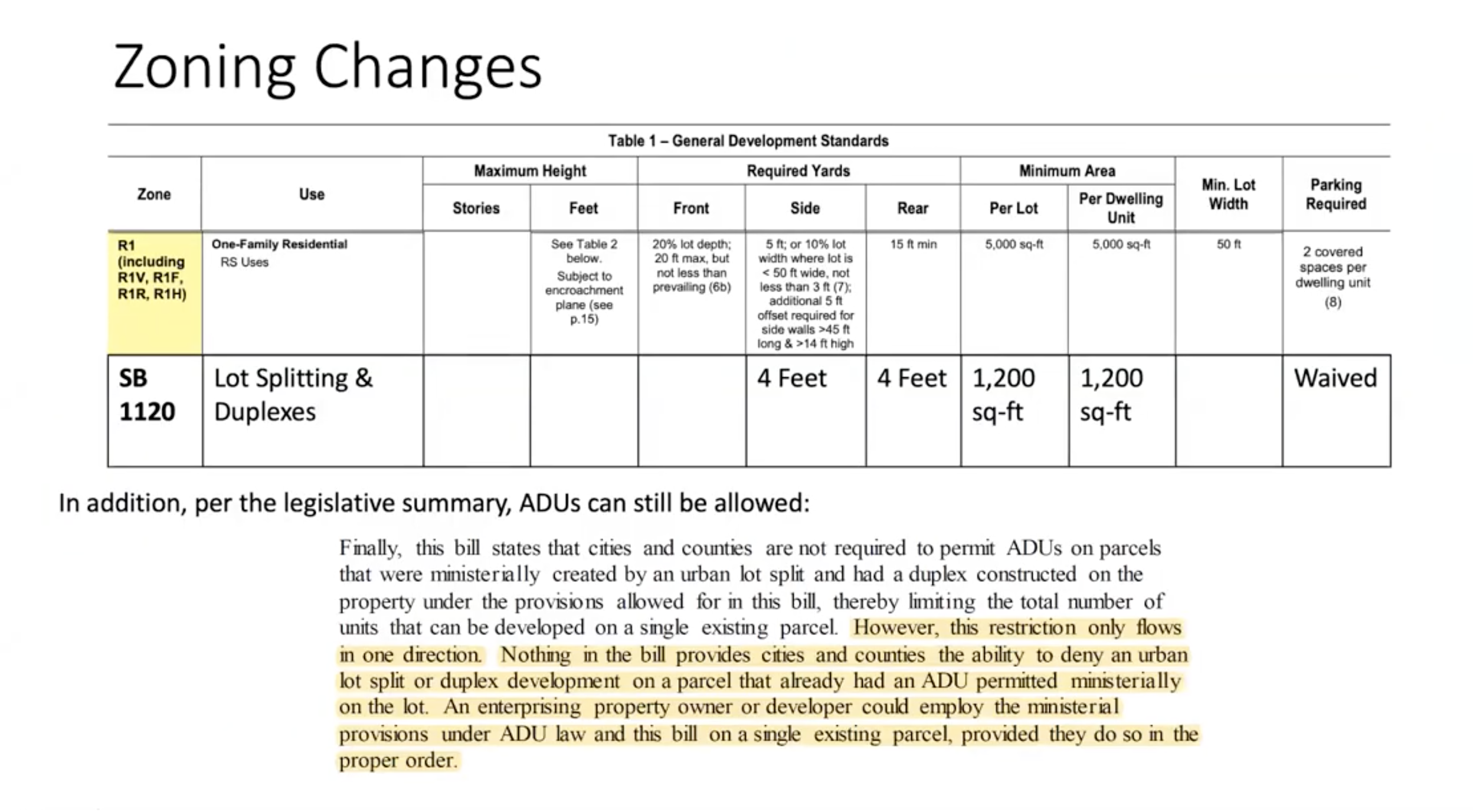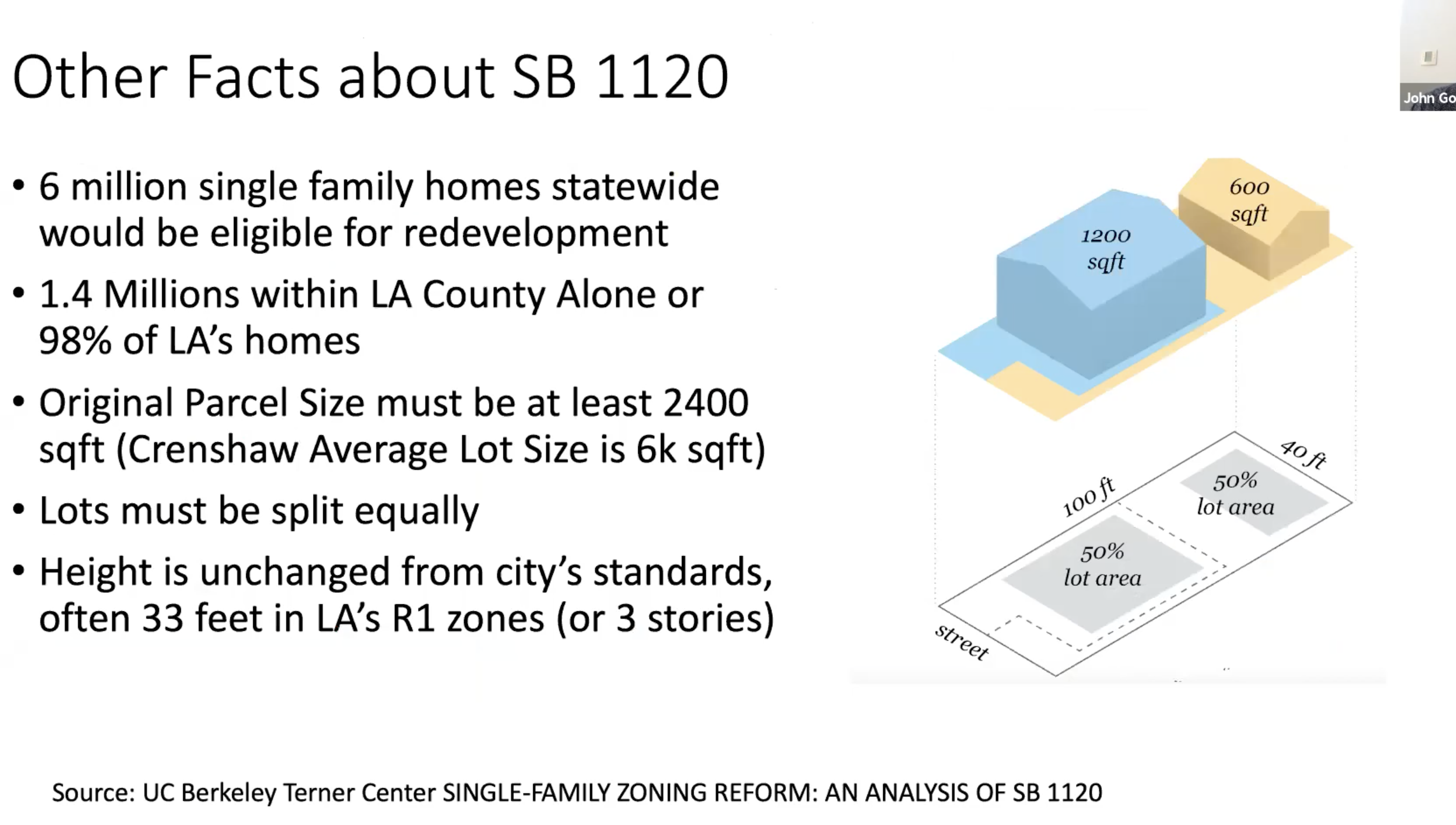Just as South Los Angeles residents and community leaders did in the Spring of 2019, again this month they joined together to voice concerns about pending State Legislation (SB 1120) that would eliminate single-family zoning and further gentrify and displace current residents in the name of more housing (with no requirement for affordability). With the state on track to build less than 20 percent of the affordable units it needs and cities buckling under the weight of the current public health and economic crises, the California Assembly is pressing forward with policy proposals aimed at eliminating local control over planning and land-use decisions. TPR excerpts this virtual town hall hosted by the South LA Alliance for Locally Planned Growth, in which LA City Councilmembers Herb Wesson and Paul Koretz register their grave opposition to the one-size-fits-all bill, SB 1120, part of a suite of proposals teed up for hearing by the Assembly Appropriations Subcommittee that would be the single biggest attack to date on the residential integrity throughout the state of California—and most especially in LA's historically disadvantaged neighborhoods of color.

Herb Wesson
“When I think about SB 1120, it’s one of the biggest insults and slaps in the face to our community that I can remember. This is as bad SB 50”—Herb Wesson
"Sacramento is trying to revive SB 50, but they're doing it with nine bad bills..in addition to the fact that we're greatly distracted by other, more pressing issues like COVID, like dealing with equity, the aftermath of George Floyd's terrible death, the fact that we're in a depression and have such high unemployment, and yet we have to deal with nine very wonky, complex planning bills.” —Paul Koretz
Herb Wesson: When I think about SB 1120, it’s one of the biggest insults and slaps in the face to our community that I can remember. This is as bad SB 50, and we could go on and on about that.
This is different in the sense that this is in bad form. It's introduced during a time when our country is in peril. We're dealing with demonstrations and calls for justice. We're dealing with the COVID-19 situation. So, we're all focused on trying to survive and help our families survive. Los Angeles, even with our flaws, has tried to be at the forefront in building housing and affordable housing.
Last year, we talked about how 75 percent of new housing built in the County of Los Angeles was built in the City of Los Angeles, even though we only make up 40 percent of the County. We get it.
We understand that we have issues that we need to address, but this should not be forced fear fed down our throat. We are not an enemy. We can sit down and creatively come up with ways to deal with this. I'm really frightened by this because it's within an eyelash of being passed and is the biggest attack on the residential integrity in our community that I can remember. Plus, it will create additional pathways to gentrification.
It’s also saying, “Local control, be damned. You don't know what you're doing.” Looking at the maps provided earlier in the presentation, it's scarier than I could imagine. I think that is critical. We need to let people see that because once you see a couple of slides, you get it.
So now we mobilize, we bring people together, and we let our representatives in Sacramento understand how we feel about this. I'm glad that Mr. Paul Koretz, from Council District 5, is on this Zoom as well. He and I have worked for the past several years trying to defeat legislation like this, and we're going to continue to do that.
Just to show how scary of a situation we're in today, on the City Council, Mr. Koretz is the maker of the motion that would have the City of Los Angeles go on record opposing SB 1120. But this is the very first time that there is also a motion submitted to support.
That has not occurred the last two times that we've had to beat this back, so we are creatively doing everything that we can to get the votes necessary and to act quickly, so the City of LA can come out opposed.
For us at this point in time, it is about how do we mobilize, strategize, and organize. If we don’t do that, we’ll be marching a lot.
I'm glad that there are so many people here because this is a call to action. My pledge and commitment to you is that this will be a priority to me. We do have a nucleus of people on the council that get this, and we're prepared to be your mouthpiece to do whatever we can.
So many people in our community saved every dime and every quarter because they fell in love with an area; that's where they wanted to live, raise their family, and that's where they wanted to die—and all of that is in jeopardy at this point in time.
There’s this idea that we're going to be able to create housing, and people aren’t going to have as many vehicles. Guys, that’s BS. I don't care where you live, you're going to scrape enough money together to have a car. Reducing parking requirements is ludicrous. Look at our neighborhoods today. There are individuals that sometimes have to park on the next street and then turn around and walk back home. There are all kinds of consequences that many people don't think of. Basically we need to say to Sacramento, “Slow down, work with us, we'll come up with creative ways to get this done.”
In the City of LA, I introduced a motion that would require if you want to develop city property, it has to be 100 percent affordable. That's what we need. We now have that space available. We're building bridge homes for homeless and permanent supportive housing. If I develop my house, do you think a homeless person’s going to afford to live here? Hell no! This is serious, and it's within an eyelash of passing.
Paul Koretz: Now, I'm a little more mellow than Herb, but I'm just as upset about all of these efforts. You all remember SB 50, which was a very divisive gentrification and luxury housing bill by Senator Scott Wiener, who believes single-family housing is immoral, tree-lined streets are immoral, front and backyards are immoral, and he wants his vision to be the state's vision for how we plan.
SB 50 would have banned single-family zoning, allowed 10-unit luxury apartments on any lot, and allowed luxury apartments five or six stories high in completely single-family neighborhoods. It's based on trickle-down economics. If you build enough luxury housing somehow that will make all housing affordable. The actual experience is the opposite. When you build luxury housing, the other housing surrounding it tends to go up in cost, rather than the other way around.
Sacramento is trying to revive SB 50, but they're doing it with nine bad bills. And so, in addition to the fact that we're greatly distracted by other, more pressing issues like COVID, like dealing with equity, and the aftermath of George Floyd's terrible death, and the fact that we're in a recession, depression, and we have such high unemployment, and yet we have to deal with nine very wonky, complex planning bills. They were successful last year in passing SB 330; while we focused on SB 50, that one squeaked through and did some damage.
Now there's nine of them. We believe that SB 1120 is the worst.
But we have to focus on all nine, which together, do as much damage as SB 50, and more.
Some of these bills cut the legislature's commitment to affordable housing favoring luxury units. Others ban single-family zoning or target black and brown neighborhoods with gentrification.
The worst bill, 1120 is wonky and confusing and is open to different interpretations. It crushes single-family zoning and is a threat to 8 million homeowners at all income levels. It allows four market-rate homes to be built where one stands now, and in cities that have accessory dwelling unit rules like Los Angeles, it would allow eight units to replace a single-family home.
SB 1120 requires no affordability, opens California to a speculation frenzy, and weakens or eliminates parking requirements. I'm already in a permit parking district, and on some days I have to walk several blocks to park. If that were eliminated, it would be a disaster in a lot of areas in Los Angeles. With SB 1120, we've largely been concerned about the form of new development, but the form of the parking requirement giveaways and form are least of our problems if this bill gets passed.
For context, you should know that the state density bonus program starts with five by-right base units, which means no affordable housing. This is an all market-rate luxury housing proposal.
As we see with 60,000 homeless in LA County, our need is not for more luxury housing to be created, it's for more affordable housing, and this eliminates affordable housing.
This bill attacks the fundamental parts of city planning. We fight to preserve control of the development tools given to local government back in 1893 to fight the forces of greed. In the evolution of the subdivision process, we learned that an unregulated market produces substandard lots with inadequate improvements in infrastructure. There are plenty of those in Los Angeles, but they were generally held over from the beginning of the last century, and many approved by other cities like Venice, which then became part of Los Angeles.
So, the state learned hard lessons about unregulated markets and approved the Map Act on March 9 of 1893, and has strengthened it numerous time since, and it's now a subdivision map at its best and gives cities the power to regulate and control the design and approval of subdivisions. It's been an unqualified success, so much so that the average homeowner doesn't have to think about the local process and the findings that have to be made by a planner to approve a map. However, this is a process that regulates the basic protections that we take for granted.
Without it, which would be the situation we would find ourselves in with SB 1120: protected desirable trees would be cut down without review and grading and erosion control, including the prevention of sedimentation or damage to existing or nearby properties, would be eliminated.
It should have explicitly protected hillsides zones, but it doesn’t. as was mentioned but it doesn't. Example in my district of someone who acted as if it wasn’t in the place: the billionaire developer named, Mohammed Hadid did grading and eliminated 45 feet of his property, and then submitted a grading plan as if he hadn’t done it. If it was done in such a way that sediment was pouring down to homeowners below. They've sued the developer because they're afraid the building and the land is going to wind up on their property. Those are the kinds of protections that we have now that we would lose.
Also, developers are often required to provide mitigations. They provide utilities, sidewalks, street lighting, gutters, and curbs because we carve those developments out of the Map Act process and require that. Those requirements would be removed.
To undo a process, which has protected public health, safety, and welfare, as SB 1120 would, without providing the opportunity and necessary funding for cities to conduct adequate environmental analysis or amend their general plans and zoning is incredibly irresponsible and it shows a lack of understanding or a lack of concern for the development process as it's been created since 1893.
It's not just about inadequate parking standards, which would be one of the very problematic areas of this, it's also about ensuring that our communities have the roads, schools, parks, and storm drains and everything else necessary to meet our infrastructure needs.
It's absolutely critical that we contact our legislators, and let them know that we feel that a vote in favor of SB 1120 and the other 8 terrible bills passing through the legislature would be a betrayal of their constituents. They need to know that. They need to hear that from you. They need to hear that from your friends, neighbors, and relatives.
It's only by getting the word out that we can stop these terrible bills that are complicated and difficult to comprehend and explain how disastrous this will be in terms of the impact on our communities. But trust me, it will and that's why I've placed so much focus the last few years on trying to defeat them
- Log in to post comments






